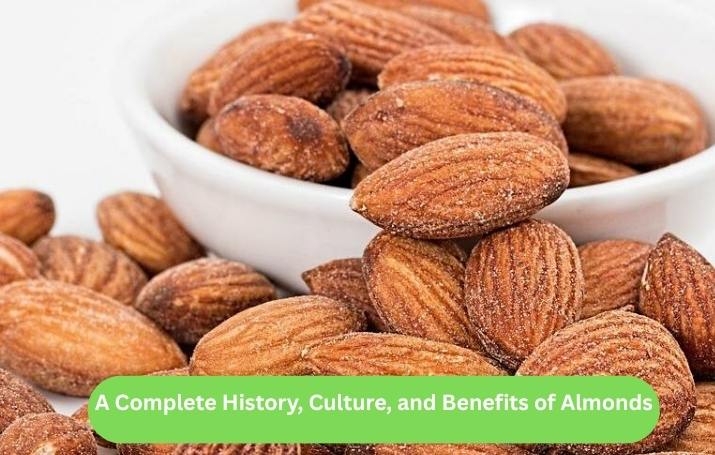
A Complete History, Culture, and Health Benefits of Almonds

Introduction
For hundreds of years, people have loved almonds, not only as a healthy food but also as a sign of wealth, optimal health, and cultural custom. People all over the world have eaten nuts for a very long time, from ancient times to the present day. They are one of the most respected in human history because they are very healthy and have been around for a long time. In this PrimeNuts blog, we explore the complete history, cultural significance, and health benefits of almonds.
The Ancient Roots of Almonds
It is thought that almonds came from the Middle East and Central Asia a very long time ago. Seeds from the past have been found in places near Iran, Turkey, and the Levant. Along the Silk Road, traders and tourists brought almonds to different parts of Asia and Europe, where they quickly became a popular food.
Almonds may have been eaten as early as 3,000 BC, according to archaeological findings. Ancient societies often included almonds in their diets and associated them with wealth and good fortune. Egyptian pharaohs also buried food in their tombs, including almonds, as a sign of life and food for the future. In early societies, their presence shows how important they were seen as.
How Almonds Spread Across Cultures?
As trade grew in Europe, almonds started to show up in more and more recipes. Almonds became a key component of both regular meals and special holiday recipes in the Mediterranean. In ancient Rome, nuts were given as gifts to show fertility and happiness. In many countries, sugared almonds are still given at weddings to bring luck, happiness, and love that lasts.
Almonds were used a lot in European food by the Middle Ages. People usually ground them up to make almond milk, which was a plant-based option for times when they couldn’t have dairy. Early herbalists also used almonds in a variety of sauces, cakes, and medicines.
It wasn’t until the middle of the 1800s that almonds made their way to the United States, specifically to California. California is a top almond producer, exporting most of its crop. This is because the state’s temperature is perfect for growing almonds.
Cultural Significance of Almonds Around the World
In many places, almonds are essential to the culture:
- In the Middle East and South Asia, almonds are linked to food and hospitality. Bowls of nuts and dried fruits are often used to greet guests. They are also an important part of holiday foods, sweets, and health drinks.
- In Europe, almonds are often eaten at traditional festivals. At weddings, sugared nuts are a sign of happiness and wealth. People still like almond pastries, marzipan, and Christmas treats made with almonds.
- In India, almonds, which are called “badam” there, are very important in Ayurveda. They’re thought to be “brain-boosting foods”, and people often soak them overnight before eating them to help their stomach and memory. A lot of people love almond milk, badam halwa, and sweets made with almonds.
Almonds are seen as more than just a food in many countries. They are also a sign of health, wealth, and new beginnings.
How to Understand Almonds Today?
These days, you can buy almonds raw, roasted, salted, blanched, sliced, or chopped. People who want to eat healthy and more plant-based foods often choose almond flour, almond butter, and almond milk. Almonds are still a popular snack food because they taste excellent, are crunchy, and are full of nutrients.
Almonds are a beneficial addition to many current diets, such as vegan, gluten-free, high-protein, and heart-healthy ones. They are easy to add to everyday meals because they can be used in sweet and savoury recipes.
Top Six Health Benefits of Almonds
1. Full of important nutrients
There are lots of vitamins, minerals, fibres, good fats, and plant proteins in almonds. They have a lot of antioxidants, magnesium, calcium, and vitamin E. A small handful of peanuts every day can help your body meet its nutritional needs and keep your energy levels steady.
2. Good for your heart
Almonds may be beneficial for your heart if you eat them regularly. Antioxidants protect against oxidative stress, and healthy monounsaturated fats help keep good cholesterol levels steady. Many studies indicate that eating almonds every day may help your heart work better and improve your blood flow.
3. Helps Manage Weight Naturally
On plans to lose weight, almonds are often suggested because they make you feel full for longer. Fibre, protein, and beneficial fats all work together to keep you from snacking on things you don’t need. Eating a few nuts in between meals can help you control your hunger and keep your energy level steady throughout the day.
4. Helps the brain work better
Almonds are revered as a food that makes the brain stronger in many countries. Antioxidants, vitamin E, and good fats are all known to help your brain and memory. As a way to keep their minds sharp, kids, adults who work, and older people often eat almonds every day.
5. Good for your hair and skin
Antioxidants and vitamin E in almonds protect your skin from free radical damage. In the past, almond oil was used to keep skin moist and hair roots strong. It may give your face a natural glow and smooth out wrinkles if you eat it frequently.
6. Good for your digestive health
Almonds have dietary fibre, which helps digestion and keeps your gut healthy. Many people say that soaked nuts are especially good for your stomach. Having almonds in the morning can help your stomach go more smoothly and your body absorb nutrients better.
A Nut with a Long History
Almonds are still one of the most popular nuts around the world, both in old times and now. Their journey from orchards in the Middle East to kitchens around the world reflects a rich history of custom, culture, and food. You can eat almonds raw, soaked, roasted, or as part of your best dish. They taste excellent and are good for you.
In addition to being a food, almonds have a long history, are good for you, and have been linked to different cultures for a long time. They have a long history and are still good for you, so they will always be a part of everyday life.
Conclusion
Almonds have been a sign of health, culture, and custom for a long time. Their use in old rituals, recipes, and health habits shows how much people have valued them for generations. People continue to enjoy nuts due to their natural health benefits, their versatility, and their positive impact on daily health. Almonds have been a part of modern diets for a long time and are still important. Eating a small amount of them every day can help your body and mind in the long run.



